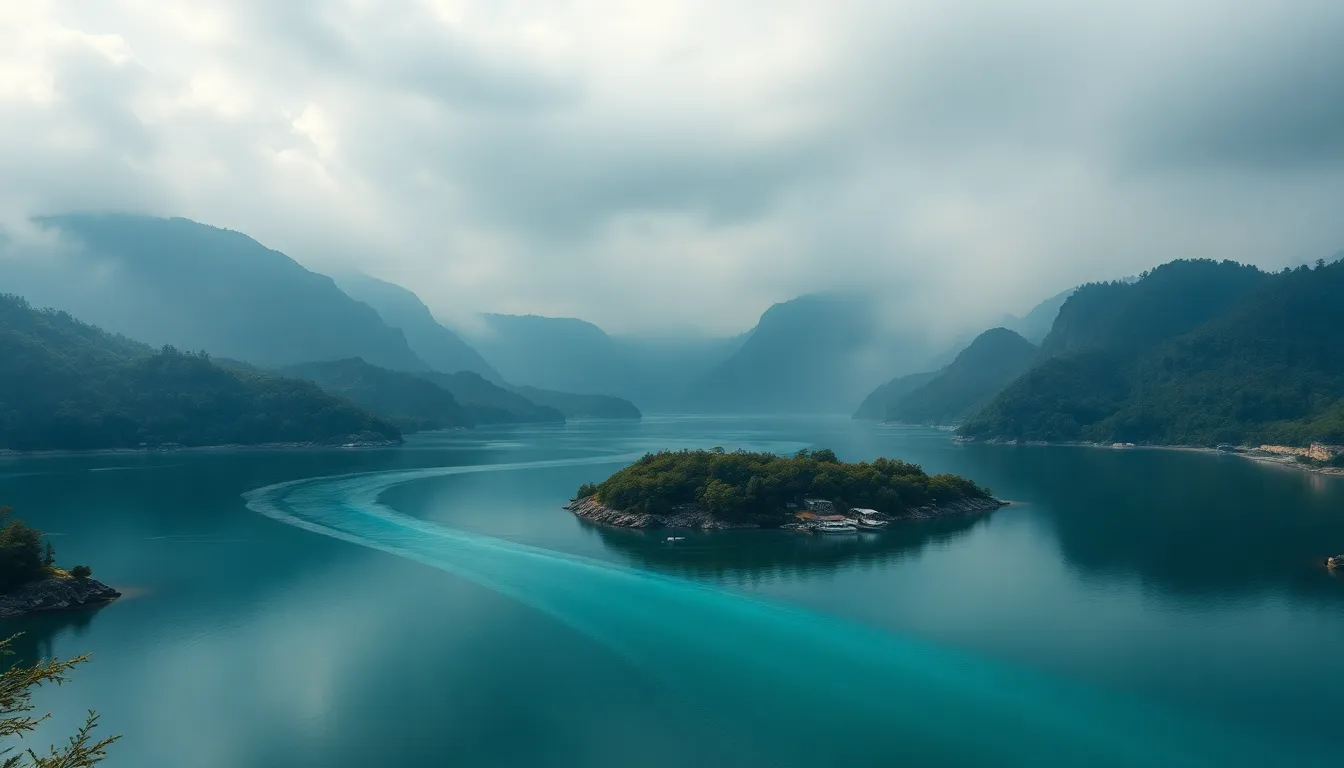The Mythical Waters: Sacred Lakes and Rivers in Lore
I. Introduction
Across the globe, water has held a place of reverence in the hearts and minds of various cultures. Sacred waters, such as lakes and rivers, are often seen as more than mere natural resources; they are imbued with meaning, myth, and spiritual significance. The concept of sacred waters in mythology encompasses a wide array of beliefs and practices that highlight the importance of these bodies of water in the lives of people throughout history.
This article aims to explore the significance of lakes and rivers in mythological traditions, examining their roles in creation stories, cultural practices, and spiritual beliefs. By delving into specific examples of sacred lakes and rivers around the world, we will uncover the rich tapestry of narratives that connect humanity to these vital sources of life.
II. The Significance of Water in Mythology
Water is often viewed as a symbol of life and fertility, a force that nourishes and sustains all living beings. In many cultures, it is associated with creation and regeneration, reflecting its essential role in the natural world.
However, water also possesses a dual nature: while it can create and nurture, it can also destroy and devastate. Floods, storms, and droughts remind us of water’s power and unpredictability. This duality is a common theme in folklore and mythology.
- Creation and Fertility: Water is often linked to birth and growth, seen as a divine element that brings forth life.
- Destruction and Chaos: Myths frequently depict water as a force of destruction, capable of sweeping away civilizations and altering landscapes.
- Transformation: Water’s ability to change from liquid to solid (ice) to vapor (steam) symbolizes change and transformation in life.
III. Sacred Lakes Around the World
A. Lake Baikal: The Oldest and Deepest Freshwater Lake
Located in Siberia, Russia, Lake Baikal is renowned for its age and depth, making it the world’s oldest and deepest freshwater lake. In local folklore, it is often considered a sacred site, rich with myths and legends.
- Myths of Origins and Spirits: According to local legends, Baikal is home to various spirits and creatures. One prominent myth involves the Baikal spirit, a guardian believed to protect the lake.
- Cultural Practices Surrounding the Lake: Indigenous Siberian tribes participate in rituals to honor the spirits of the lake, including offerings and prayers for good fortune and prosperity.
B. Lake Titicaca: The Birthplace of the Inca Civilization
Situated on the border of Peru and Bolivia, Lake Titicaca is steeped in mythology and is revered as the birthplace of the Inca civilization. The lake’s high altitude and mystical beauty have contributed to its sacred status.
- Mythological Narratives of Creation: In Inca mythology, Lake Titicaca is the birthplace of the sun and the first Inca, Manco Cápac, who emerged from its waters to establish the Inca Empire.
- Rituals and Festivals: The lake is the site of various festivals, including the Feast of the Virgin of Candelaria, where locals celebrate with music, dance, and offerings to the lake.
C. The Black Lake (Crno Jezero) in Montenegro
Known for its striking beauty, the Black Lake is surrounded by mountains and forests, making it a site of both natural and mythical significance.
- Folklore and Legends: Local legends speak of fairies and mystical creatures that inhabit the lake, often associated with love and tragedy.
- The Lake’s Significance in Local Spirituality: The Black Lake is considered a place of healing and reflection, where locals often go to meditate and connect with nature.
IV. Rivers of Myth: A Journey Through Sacred Waters
A. The Ganges: Mother Ganga in Hindu Tradition
The Ganges River, known as Ganga in Hindu tradition, is considered the holiest river in India. It is revered as a divine entity and is integral to Hindu spirituality and culture.
- Myths Surrounding the River’s Descent to Earth: According to Hindu mythology, the Ganges descended from the heavens to Earth, and her waters are believed to purify the soul.
- Pilgrimages and Religious Ceremonies: Millions flock to the Ganges for ritual bathing, particularly during festivals like Kumbh Mela, to wash away sins and attain salvation.
B. The Nile: Lifeblood of Ancient Egypt
The Nile River was integral to the development of Ancient Egyptian civilization. It not only provided water for agriculture but also held deep spiritual significance.
- Creation Myths and the Nile’s Divine Association: In ancient myths, the Nile was believed to be a gift from the gods, essential for life and fertility.
- Festivals and Rituals Linked to the River: The flooding of the Nile was celebrated with festivals, as it brought nutrients to the land and ensured a good harvest.
C. The River Styx: Crossing into the Underworld
In Greek mythology, the River Styx is famous for its role as the boundary between Earth and the Underworld. It is shrouded in mystery and fear.
- Myths of Charon and the Afterlife: Souls of the deceased were ferried across the Styx by Charon, the boatman, in exchange for a coin, symbolizing the transition between life and death.
- Symbolism of the Styx in Literature and Art: The Styx has been depicted in various works of literature and art, often representing fear of death and the unknown.
V. Lakes and Rivers in Native American Lore
A. The Great Lakes: Sacred Sites for Indigenous Tribes
The Great Lakes hold deep spiritual and cultural significance for many Native American tribes, with numerous creation stories linked to these waters.
- Creation Stories and Their Meanings: Many tribes believe that the Great Lakes were formed by the actions of powerful spirits or deities, often seen as a source of life and sustenance.
- Modern-Day Significance and Conservation Efforts: Today, Indigenous communities advocate for the protection and preservation of the Great Lakes, emphasizing their cultural and spiritual importance.
B. The Mississippi River: A Cultural and Spiritual Artery
The Mississippi River is not only a vital resource but also a significant cultural and spiritual landmark for many Native American tribes.
- Myths and Legends of the River’s Importance: The Mississippi is often referred to as a “river of life,” with legends celebrating its role in the creation of the land and its people.
- The River’s Role in Native American History and Culture: The Mississippi has been a central artery for trade, travel, and spiritual practices for centuries, linking various tribes and communities.
VI. The Role of Water Spirits and Deities
A. Water Deities in Various Mythologies
Across different cultures, water deities hold significant roles in myths about creation and destruction, symbolizing the power and sanctity of water.
- Greek Beliefs: Gods like Poseidon controlled the seas, while nymphs represented the spirits of rivers and lakes.
- Egyptian Beliefs: The Nile was personified as the god Hapi, who brought fertility and abundance.
- Indigenous Beliefs: Many tribes believe in water spirits that protect and govern lakes and rivers, often associated with specific locations.
B. Spirits of Lakes and Rivers
Moreover, many cultures believe in the existence of spirits that inhabit lakes and rivers. These spirits are often revered and respected, with rituals performed to honor them. In some traditions, failing to pay homage to these spirits can lead to misfortune or disaster.
In conclusion, sacred lakes and rivers are deeply woven into the fabric of myth and culture around the world. Their significance transcends mere physical presence, becoming symbols of life, death, and the interconnectedness of nature and humanity. Through understanding and respecting these mythical waters, we gain insight into the values and beliefs of diverse cultures, reminding us of the profound relationship between people and the natural world.</p



